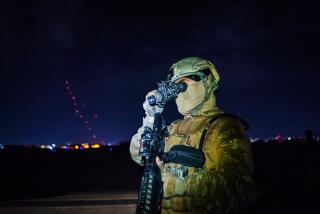Report Details Fallouja’s Arsenal
- Share via
BAGHDAD — U.S. forces in Iraq seized more than three times as many weapons caches in the former rebel stronghold of Fallouja in the last three weeks as are confiscated throughout the country during an average month, according to a new intelligence summary.
Troops discovered weapons at about 350 sites in Fallouja, the report said. That compares with 103 stashes normally found nationwide per month, according to the report, portions of which were reviewed Monday by a Times reporter.
The seizures, amounting to tons of weaponry -- including rifles and heavy bombs, hand grenades and artillery rounds -- are part of what U.S. authorities described as an intelligence and tactical bonanza uncovered in the city 35 miles west of Baghdad. The munitions were found in homes, mosques, cargo containers, bunkers and other sites.
Among the most novel finds was an ice cream truck that had been converted into a mobile car-bomb factory, with all the parts and weaponry needed to turn any vehicle into a weapon on the spot.
“You got an ice cream truck, it’s loaded with munitions, weapons, equipment to construct a car bomb,” said a senior U.S. military official here, who declined to be identified. “It could potentially drive anywhere, stop, convert a car into a car bomb and drive away.... I don’t think there was any ice cream.”
The report also underscored mosques’ central role in the insurgency. Sixty-six of the city’s 133 mosques were discovered with significant quantities of weapons. During the assault, mosques often became battle zones as U.S. forces exchanged fire with snipers who took cover in minarets and inside the compounds. Many religious sites were badly damaged.
Before about 10,000 U.S. troops and 2,000 Iraqi soldiers and police marched into the city early this month, Fallouja was regarded as the capital of the insurgency. The U.S.-led force routed the guerrillas, killing an estimated 2,000 of them. At least 51 American troops and eight of their Iraqi allies also lost their lives.
U.S. officials are processing a bounty of seized intelligence material, including telephone records of suspected insurgent group leaders and their contacts, ledgers of foreign fighters and data on insurgents found on computer hard drives, compact discs and other media. Many training manuals and how-to books on making homemade bombs were also found.
Troops discovered eight houses where prisoners were held and probably tortured, the report said. At least one house had bloodstained walls and floors. Bloody handprints were seen there, along with bags of sand used to absorb victims’ blood. Another house contained original pictures of the beheading of Kenneth Bigley, a Briton who was kidnapped in Baghdad in September and slain the following month.
“There’s just lots and lots of material,” Lt. Col. George Bristol, intelligence officer for the 1st Marine Division, said recently as he toured Fallouja with other commanders. “Certainly there will be some things that will come out of here and will help us in the future.”
Among the sites discovered, the report said, were 26 factories producing car bombs and other explosives. Troops found at least 650 homemade bombs, some planted, others stacked and ready to be deployed. That compares with 770 homemade bombs found or detonated each month throughout the country, the senior military official said.
U.S. troops also discovered several crude chemical laboratories, including caches of poisons, beakers and protective gear including gas masks. Insurgents are believed to have been trying to make rudimentary chemical weapons and explosives, officials say. Notes found in the labs indicated that rebels were conducting training and research on chemical weapons.
Among the materials in one laboratory, U.S. officials said, were potassium cyanide and hydrochloric acid, both of which can be used in the production of poisonous gas; sulfuric acid, a possible component of chemical weapons and explosives; and various agricultural fertilizers that can be used in explosives.
It was not clear if any chemical weapons were deployed during the battle for the city or if any U.S. troops were injured by such weapons.
Although much evidence of recruitment of foreign fighters was found, fewer than 30 were among the legions of prisoners taken, the report indicated, which bolsters the view that the insurgency is largely homegrown. More than 1,000 prisoners from Fallouja are still being held.
The “third country nationals” arrested during the operation, the report stated, included six Egyptians, six Syrians, three Saudis, three Sudanese, two Jordanians, a Palestinian and one fighter each from Libya, Tunisia and Britain. No further information was available about those arrested.
U.S. commanders, however, say many foreign fighters, who may have died in the battle, carried no identification. Many dead guerrillas were found with Korans that were printed in other nations, the senior military officer said.
U.S. officials, although calling Fallouja a major setback for the rebels, have stopped short of saying the defeat was a fatal blow to the insurgency. More than 10,000 insurgents are estimated to be operating in a wide swath of the country, especially in the Sunni Muslim heartland of central, northern and western Iraq.
They remain well armed in a nation that is awash in weapons, many dating back to the regime of Saddam Hussein, who was deposed in the spring of 2003.
More to Read
Sign up for Essential California
The most important California stories and recommendations in your inbox every morning.
You may occasionally receive promotional content from the Los Angeles Times.










